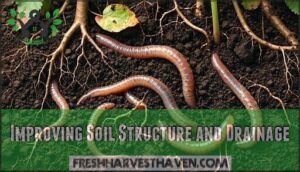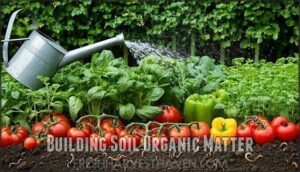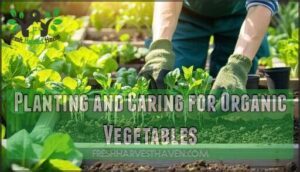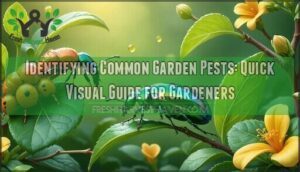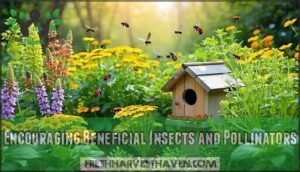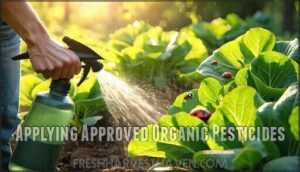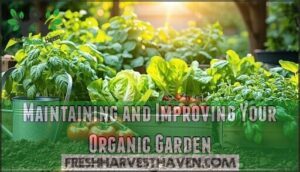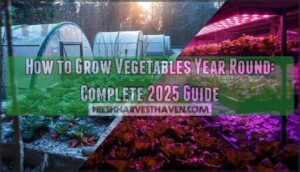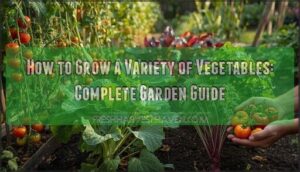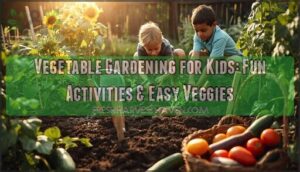This site is supported by our readers. We may earn a commission, at no cost to you, if you purchase through links.

You’ll want to rotate your crops each season so your soil doesn’t get worn out.
Plant things together that help each other out—like basil near tomatoes to keep bugs away. Let the good bugs do their thing too.
If problems pop up, throw up some row covers or use organic sprays as your backup plan.
Think of it as working with nature’s blueprint rather than fighting against it. Success comes from patience and understanding that healthy soil creates healthy plants that naturally resist problems.
Table Of Contents
- Key Takeaways
- Key Principles of Organic Vegetable Gardening
- Preparing Healthy Organic Garden Soil
- Planting and Caring for Organic Vegetables
- Natural Methods for Organic Pest Control
- Maintaining and Improving Your Organic Garden
- Frequently Asked Questions (FAQs)
- How to have an organic vegetable garden?
- What is a disadvantage of organic gardening?
- What is the best method for growing vegetables?
- What is the easiest crop to grow organically?
- What is the best way to grow organic vegetables?
- How to make an organic vegetable garden?
- What is organic vegetable gardening?
- Should you start an organic vegetable garden?
- How do you produce vegetables organically?
- Is an organic vegetable garden a good idea?
- Conclusion
Key Takeaways
- Build healthy soil first – Success starts with compost-rich soil amendments and organic matter that create the foundation for strong, naturally pest-resistant plants without synthetic fertilizers.
- Use integrated pest management – Combine beneficial insects, companion planting, physical barriers, and approved organic pesticides to control pests naturally while maintaining ecological balance.
- Practice crop rotation and proper spacing – Rotate plant families annually to prevent soil depletion and disease buildup while giving vegetables adequate room for airflow and sunlight access.
- Focus on prevention over treatment – Regular monitoring, proper watering techniques, mulching for moisture retention, and selecting disease-resistant varieties prevent problems before they require intervention.
Key Principles of Organic Vegetable Gardening
Organic vegetable gardening builds healthy soil and produces food without synthetic chemicals, pesticides, or genetically modified seeds.
This approach creates a sustainable garden ecosystem that benefits both your family’s health and the environment around you.
Defining Organic Gardening Methods
Organic gardening isn’t just about skipping chemicals—it’s about working with nature’s own playbook to grow healthier food. This sustainable agriculture approach builds soil health through organic matter like compost and manure. Historical context shows organic farming predates modern synthetic methods, making it agriculture’s original practice.
- Organic definitions emphasize natural processes over synthetic inputs
- Method origins trace back thousands of years before chemical agriculture
- Modern interpretations blend traditional wisdom with scientific understanding
- Misconceptions clarified: organic doesn’t mean pesticide-free, just naturally-derived
- Agricultural practices focus on soil biology and ecosystem balance
Avoiding Synthetic Chemicals and Pesticides
Think of synthetic chemicals as shortcuts that might seem helpful at first, but they’re like junk food for your garden—convenient now, but they’ll weaken your soil’s long-term health. Instead of reaching for synthetic pesticides, you can build stronger defenses using natural pest deterrents and chemical-free gardening methods that foster soil health.
Synthetic Chemical Natural Alternative
These organic farming practices create resilient agricultural practices that protect both your family and the environment while producing healthier organic food production.
Understanding Organic Certification Standards
Before planting your first organic vegetables, you’ll want to understand what makes gardening truly "organic" according to official standards. The USDA organic certification requires strict compliance with four key requirements:
- No synthetic chemicals – fertilizers, pesticides, and herbicides must come from natural sources
- Detailed record-keeping – every input and practice must be documented for annual inspections
- Third-party verification – certification bodies conduct announced and unannounced audits
- Labeling compliance – products need 95% organic ingredients to earn the USDA Organic seal
These 40+ certification bodies do the heavy lifting—they inspect farms, verify practices, and make sure that organic label actually means something to shoppers.
International standard variations exist between USDA, EU, and other organic food standards, but all focus on organic food production without synthetic inputs. Japan’s JAS Organic Certification is a widely recognized standard.
Benefits for Health and Environment
Your garden becomes a powerful ally for both your family’s health and the planet’s future when you choose organic methods. Research shows organic vegetables contain higher nutrient density while reducing pesticide residues on your food. These practices improve soil health through natural amendments and foster water conservation.
| Health Benefits | Environmental Benefits |
|---|---|
| Reduced pesticide exposure | Enhanced soil quality |
| Higher antioxidant levels | Improved water conservation |
| Better nutrient absorption | Carbon sequestration in soil |
| Lower chemical residues | Stronger ecological balance |
| Improved human health outcomes | Biodiversity protection |
Preparing Healthy Organic Garden Soil
Your garden’s foundation starts beneath the surface, where healthy soil creates the conditions for thriving vegetables.
Building nutrient-rich soil through composting, proper drainage, and organic matter takes time but pays dividends in stronger plants and better harvests.
Amending Soil With Compost and Manure
Healthy soil acts like a savings account for your garden—the richer the deposits of compost and manure you make, the greater the dividends your vegetables will pay.
Rich soil deposits of compost and manure pay dividends in stronger vegetable harvests—treat your garden like a savings account
Well-aged compost provides slow-release nutrients while improving soil quality through organic matter. Fresh manure burns plants, so age it six months before application.
Test your soil first to determine which amendments your organic production system needs most.
Improving Soil Structure and Drainage
Think of soil like a sponge that’s been sitting in your basement for years – it’s either rock-hard or waterlogged, and neither does your vegetables any favors. Good drainage and soil structure create the ecological balance your plants need to thrive.
Breaking up compacted soil takes some strategy, but these five approaches will get your soil breathing again:
- Add coarse organic matter like shredded leaves
- Create raised beds for better drainage system design
- Avoid walking on wet soil
- Use cover crops for erosion control practices
- Mix in perlite or sand for heavy clay soils
Building Soil Organic Matter
Soil organic matter acts like a savings account for your garden, storing nutrients and water that plants can withdraw when they need them most. Building this organic matter through cover cropping and vermicomposting creates a thriving ecosystem where soil microbes break down organic ingredients into plant food.
| Method | Benefits | Implementation |
|---|---|---|
| Compost Tea | Feeds soil microbes, improves nutrient uptake | Steep finished compost in water for 24-48 hours |
| Green Manure | Adds nitrogen, improves soil structure | Plant legumes like clover, till before flowering |
| Vermicomposting | Creates nutrient-rich castings, fosters biodiversity | Use red worms to decompose kitchen scraps |
| Cover Crops | Prevents erosion, adds organic matter | Plant winter rye or buckwheat between seasons |
These methods work together to improve soil quality and maintain ecological balance in your organic garden.
Planting and Caring for Organic Vegetables
Once your soil is ready, choosing the right plants and caring for them properly sets the foundation for a thriving organic garden.
Smart planting decisions and consistent care practices will help your vegetables grow strong without synthetic chemicals.
Selecting Organic Seeds and Seedlings
Your garden’s success starts long before you plant anything – it begins with choosing seeds and seedlings that match your organic commitment. Look for the USDA Organic Seal on seed packets and transplants to confirm they meet organic certification standards without synthetic chemicals.
- Seed Source Matters – Choose certified organic seeds from reputable suppliers who follow strict organic food production guidelines
- Heirloom vs Hybrid – Consider heirloom varieties for seed saving and unique flavors, or hybrids for disease resistance and seedling vigor
- Starting Indoors – Begin heat-loving crops like tomatoes indoors 6-8 weeks before transplanting for stronger establishment
Planning Crop Rotation and Companion Planting
Smart gardeners know that plants, like people, have favorite neighbors and enemies they’d rather avoid. Crop rotation prevents soil depletion and breaks pest cycles that damage food production.
Plant tomatoes after legumes to boost soil health, or pair basil with peppers for natural pest management. A simple companion chart helps increase yield while maintaining ecological balance and biodiversity in your organic garden.
Watering and Mulching Techniques
Water is the lifeline of your garden, but without proper mulching, you’re practically pouring liquid gold through a sieve. Efficient irrigation paired with organic mulch creates the perfect foundation for water conservation and soil moisture retention:
- Apply 2-3 inches of straw or shredded leaves around plants
- Water deeply but less frequently to encourage root growth
- Use drip irrigation or soaker hoses for targeted delivery
- Check soil moisture 2 inches down before watering
This combination aids weed suppression while maintaining ecological balance essential for food production.
Proper Plant Spacing and Support
Think of your vegetables like people at a party – give them enough room to breathe and they’ll thrive, but crowd them together and everyone suffers.
Proper spacing for sunlight gets each plant what it needs for healthy organic crop production.
Use vertical growing methods and trellis construction with sturdy bracing materials to increase your food production while maintaining good airflow and spacing throughout your supply chain.
Natural Methods for Organic Pest Control
Protecting your organic vegetables from pests requires a toolkit of natural strategies that work with nature rather than against it.
You’ll learn to identify common threats, attract helpful insects, and use gentle but effective methods to keep your harvest healthy.
Identifying Common Garden Pests
Garden pests hit organic vegetables hard, and each one has its own timing and tricks. You’ll want to check leaf undersides at night with a magnifying glass—that’s when you’ll catch aphids, caterpillars, and sneaky cutworms doing their damage.
What bugs you’ll face depends on where you live and what time of year it is. Your best bet? Get ahead of the problem by bringing in the good guys—ladybugs are fantastic for keeping aphids in check.
Knowing which pest is which keeps your organic food safe and cuts down on needing anything with chemical residues.
Encouraging Beneficial Insects and Pollinators
Your garden’s best defense against harmful pests isn’t found in a spray bottle—it’s already flying around your backyard waiting for an invitation. Plant insectary plants like yarrow and dill to attract natural predators such as ladybugs and parasitic wasps.
Create pollinator habitats with butterfly gardens and bee houses. These organic methods reduce pesticide residues while building consumer awareness about sustainable gardening practices.
Using Physical Barriers and Traps
Sometimes the best defense is a simple fence – physical barriers can stop pests in their tracks without a single spray bottle in sight.
Row covers made from lightweight fabric shield crops from flying insects while letting sunlight through. Copper tape around raised beds repels slugs naturally. DIY traps using yellow sticky cards catch aphids and whiteflies effectively.
These barrier materials protect your organic food from pests without artificial chemicals or pesticide residues.
Applying Approved Organic Pesticides
The USDA National Organic Program strictly regulates which pesticides you can use in organic gardens. Approved organic pesticides like spinosad and pyrethrin-based products offer 60-75% pest control efficacy while maintaining organic certification standards.
The good news? These natural options leave way fewer chemical residues than synthetic pesticides and won’t harm the environment nearly as much.
Just make sure you follow the NOP guidelines when applying them and double-check that any product you buy actually meets organic standards before using it.
Maintaining and Improving Your Organic Garden
Your organic garden needs regular care to stay productive and healthy. Think of maintenance as tending a living system that rewards consistent attention with better harvests and fewer problems.
Fertilizing With Natural Amendments
Think of natural fertilizers as your garden’s favorite meal—rich, nourishing, and packed with everything your vegetables crave to thrive. These organic ingredients feed your soil without chemical fertilizers, building consumer awareness about natural products that work.
- Compost Tea – Liquid gold that delivers nutrients directly to roots
- Worm Castings – Gentle, slow-release nutrition your plants love
- Bone Meal – Phosphorus powerhouse for strong root development
- Rock Phosphate – Long-lasting mineral boost for flowering vegetables
- Green Manure – Cover crops that enrich soil when tilled under
Ongoing Monitoring for Pests and Diseases
Like a detective scanning for clues, you need to patrol your garden regularly to catch problems before they spiral out of control.
Walk through weekly, checking leaves for spots or holes that signal disease or pest damage. Early detection means you can use gentler organic methods like removing affected plants or introducing beneficial insects before reaching action thresholds that require stronger intervention.
Seasonal Garden Cleanup and Soil Care
When the growing season ends, your garden doesn’t just need a goodbye—it needs a proper send-off that sets the stage for next year’s success. Clear spent plants and weeds to prevent disease carryover.
Add finished compost and organic ingredients like aged manure for Fall Soil Prep. Cover beds with mulch for Winter Protection, making sure your soil stays rich with organic matter that meets USDA organic standards.
Record-Keeping and Continuous Learning
Your garden notebook becomes your personal research lab, capturing the wins and mistakes that make you a smarter grower each season. Track what works through garden journaling and data analysis of your organic food production. Use learning resources and consumer education resources to develop adaptive strategies that boost your soil health and yields.
- Document planting dates, weather patterns, and harvest yields to identify your garden’s peak performance windows
- Record pest outbreaks and successful organic treatments to build your natural management toolkit
- Note which varieties thrive in your conditions to improve future seed selections and improve organic food certification compliance
Frequently Asked Questions (FAQs)
How to have an organic vegetable garden?
Ironically, creating an "organic" garden requires more planning than throwing chemicals at problems. Start with soil testing to understand your foundation.
Select certified organic seeds and focus on garden planning that includes crop rotation.
Build healthy soil through composting, then implement natural pest management strategies while practicing water conservation throughout your growing season.
What is a disadvantage of organic gardening?
Starting an organic garden? You’re probably going to hit some bumps along the way. First thing you’ll notice – your tomatoes won’t be as massive as your neighbor’s who uses Miracle-Gro. Organic methods typically give you about 20-25% smaller harvests, which stings when you’re dreaming of endless homegrown salads.
Then there’s your wallet. Those organic fertilizers and pest control products cost a pretty penny – sometimes double what the synthetic stuff runs. And get ready to spend your weekends pulling weeds by hand instead of just spraying them away.
| Challenge | Impact |
|---|---|
| Lower Yields | 20-25% reduced harvest compared to conventional methods |
| Higher Costs | Organic ingredients cost 30-50% more than synthetic alternatives |
| Labor Intensive | Requires 2-3x more time for weeding and pest management |
| Pest Susceptibility | Crops face greater insect and disease pressure without chemical protection |
| Slower Growth | Plants develop 15-20% slower without synthetic fertilizers |
Despite these disadvantages, many gardeners find the health benefits and enhanced nutritional value of organic food worth the extra effort. Your patience and persistence will pay off as soil health improves over time.
What is the best method for growing vegetables?
Square-foot gardening tops the list for vegetable cultivation success. This method combines yield boosting with beginner friendliness through systematic space efficiency and water conservation techniques.
- Raised bed construction – Build 4×4 foot boxes filled with quality organic ingredients
- Grid system planning – Divide beds into one-foot squares for best plant spacing
- Companion planting – Pair vegetables that foster each other’s growth naturally
- Succession planting – Stagger plantings every 2-3 weeks for continuous harvests
- Vertical growing – Use trellises and props to boost nutrient density per square foot
What is the easiest crop to grow organically?
Why do 95% of new gardeners succeed with lettuce? Lettuce ranks as the easiest organic crop because it’s naturally pest-resistant and grows quickly in cool weather.
These beginner-friendly crops need minimal care, making organic food production simple for newcomers seeking fresh organic ingredients.
What is the best way to grow organic vegetables?
Building healthy soil forms the foundation of successful organic vegetable production. Start with compost-rich amendments that foster the Soil Food Web and promote natural Nutrient Cycling while following USDA organic standards.
- Focus on soil health through regular compost additions and cover crops
- Practice Water Conservation with mulching and efficient irrigation systems
- Implement Seed Saving and Biodynamic Practices for sustainable garden cycles
How to make an organic vegetable garden?
Creating an organic vegetable garden starts with smart garden site selection—choose spots with 6-8 hours of sunlight and good drainage. Container gardening and raised beds work well for beginners, while vertical gardening maximizes space.
Focus on building healthy soil through composting at home and adding organic ingredients like aged manure. Your organic vegetable gardening success depends on meeting USDA organic standards—no synthetic fertilizers or pesticides. The organic food certification process ensures your harvest qualifies as true organic food.
| Planning Step | Key Considerations |
|---|---|
| Site Selection | Full sun, proper drainage, accessibility |
| Soil Preparation | Composting at home, organic amendments |
| Growing Method | Raised beds, containers, or ground plots |
What is organic vegetable gardening?
Some folks call it chemical-free cultivation, but organic vegetable gardening is really about working with nature instead of against it. You skip the synthetic pesticides and fertilizers, focusing on healthy soil and natural plant care instead.
Here’s what organic gardening looks like:
- Building rich soil with compost instead of chemical fertilizers
- Managing pests through beneficial insects rather than toxic sprays
- Using organic ingredients like manure for plant nutrition
- Following USDA organic seal standards for organic food certification process
This approach creates healthier organic food while protecting your family and environment from harmful chemicals.
Should you start an organic vegetable garden?
Success in organic vegetable gardening depends on your space requirements, time commitment, and lifestyle alignment.
Garden health benefits include fresh organic food and ingredients, while cost considerations vary based on setup expenses versus long-term savings from homegrown organic products.
How do you produce vegetables organically?
Growing vegetables organically means working with nature instead of against it. You skip synthetic chemicals and focus on building healthy soil that naturally supports strong plants.
The approach centers on five key areas:
- Soil Preparation – Add compost and organic matter to create a nutrient-rich growing medium
- Seed Selection – Choose certified organic seeds and disease-resistant varieties
- Pest Management – Use beneficial insects, barriers, and approved organic products
- Water Conservation – Apply mulch and drip irrigation for efficient moisture retention
- Crop Rotation – Rotate plant families annually to prevent soil depletion and disease
Getting organic certification requires a three-year commitment to avoid synthetic pesticides, herbicides, and fertilizers. When buying materials like compost and soil amendments, stick with certified organic products to maintain your garden’s status.
Is an organic vegetable garden a good idea?
While organic vegetable gardens require more upfront effort, they deliver healthier food with fewer chemical residues. The long-term benefits include reduced environmental impact, better soil health, and potential cost savings once established. Beginners can start small and gradually expand their organic gardening skills.
| Consideration | Organic Garden | Conventional Garden |
|---|---|---|
| Health Benefits | Higher antioxidants, no synthetic pesticides | Standard nutrition, pesticide residues possible |
| Environmental Impact | Builds soil organic matter, fosters biodiversity | May deplete soil, chemical runoff |
| Beginner Friendliness | Steeper learning curve, natural methods | Easier pest control, quick fixes available |
The organic certification process ensures your homegrown organic food meets strict standards. Though organic ingredients cost more initially, you’ll gain valuable knowledge about soil health and natural pest management. Your organic label isn’t just about avoiding chemicals—it’s about creating a sustainable system that feeds both your family and the earth beneath your feet.
Conclusion
Growing organic vegetables is like tending a living symphony where every element plays its part. Your garden rewards patience with vibrant harvests when you master these organic vegetable gardening methods.
Remember that healthy soil creates resilient plants that naturally resist pests and diseases. Start small, observe closely, and let nature guide your decisions.
Each season teaches new lessons about working with natural cycles rather than against them.


